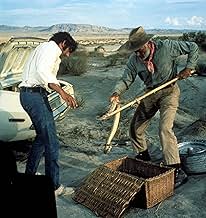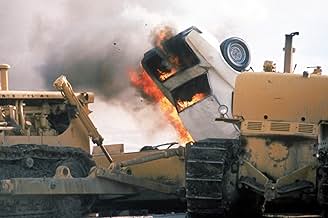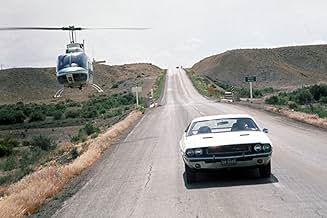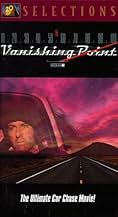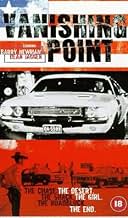ÉVALUATION IMDb
7,2/10
32 k
MA NOTE
Dans les années 1970, le pilote Kowalski convoie des bolides en un temps record, mais a toujours des problèmes avec les flics de la route.Dans les années 1970, le pilote Kowalski convoie des bolides en un temps record, mais a toujours des problèmes avec les flics de la route.Dans les années 1970, le pilote Kowalski convoie des bolides en un temps record, mais a toujours des problèmes avec les flics de la route.
- Director
- Writers
- Stars
- Prix
- 1 nomination au total
Charlotte Rampling
- Hitch-Hiker
- (scenes deleted)
Robert Donner
- Deputy Collins
- (as Bob Donner)
Avis en vedette
Many people don't know where the radio d.j. was broadcasting from in the movie. He was broadcasting from the then closed Goldfield Hotel, in beautiful "downtown" Goldfield Nevada! I should know! I was a resident in this picturesque little town of 110 people (in 1971). The Goldfield Hotel has since found new life as a restored historical landmark. The town itself has surged in population due to new mining processes, and the re-opening of the long closed mines. During the movie, a scene picturing the front of the "Green Frog Market", you will see the faint glow of a freckle-faced, red headed little boy, gazing out of the window......yeah..it's me!! This movie was quite exciting in a town of 110 people!
Gosh, I had forgotten how powerful this is.
Seeing it again is a real lesson on how certain cinematic language, if presented purely, transcends. And for a US-made movie, it is pretty pure.
If you do not know it, the primary narrative is essentially no narrative: a muscle car speeding across the desert chased by police, initially for speeding and ultimately just to exert power. This fellow is Kowalski, a name imported from a landmark film. He simply drives. It is his life now. We see flashbacks. Find he was a Medal of Honor winner in Vietnam, a star racer and then a cop. There's a backstory about his being a good cop and turning in some rotten apples, so by degrees we come to understand the moral landscape.
There is only one other character, a blind black disk jockey who is listened to by apparently everyone. Guided by his eavesdropping on police radio, and some psychic ability.
This was after "Easy Rider" and instead of bold men moving into a life, we have life chasing an honest man. Same ethic, could even have been the same man. But he knows himself. He knows he is a cinematic creature, someone to be observed and dreamed about. He knows he carries his world with him. Always borrowed.
You can see Malick here, the notion that the character sees us seeing him, that he knows he is fictional and knows we think him not. You can trace it to the female version in "Thelma and Louise," where they have their end only because they know someone will watch. Its not like "Cool Hand Luke," or "Bonnie and Clyde" at all where the man decides. That comes from the Hollywood western.
Its derived from the "Breathless" tradition.
A good third of this film is spent on the "audience," the rural townspeople. These parts are filmed in a documentary style, with — it seems — real people who have come to watch the filming, having heard on the radio from a borrowed soul. They look dumb and bored, clearly with nothing better to do than watch, just like us.
Ted's Evaluation -- 3 of 3: Worth watching.
Seeing it again is a real lesson on how certain cinematic language, if presented purely, transcends. And for a US-made movie, it is pretty pure.
If you do not know it, the primary narrative is essentially no narrative: a muscle car speeding across the desert chased by police, initially for speeding and ultimately just to exert power. This fellow is Kowalski, a name imported from a landmark film. He simply drives. It is his life now. We see flashbacks. Find he was a Medal of Honor winner in Vietnam, a star racer and then a cop. There's a backstory about his being a good cop and turning in some rotten apples, so by degrees we come to understand the moral landscape.
There is only one other character, a blind black disk jockey who is listened to by apparently everyone. Guided by his eavesdropping on police radio, and some psychic ability.
This was after "Easy Rider" and instead of bold men moving into a life, we have life chasing an honest man. Same ethic, could even have been the same man. But he knows himself. He knows he is a cinematic creature, someone to be observed and dreamed about. He knows he carries his world with him. Always borrowed.
You can see Malick here, the notion that the character sees us seeing him, that he knows he is fictional and knows we think him not. You can trace it to the female version in "Thelma and Louise," where they have their end only because they know someone will watch. Its not like "Cool Hand Luke," or "Bonnie and Clyde" at all where the man decides. That comes from the Hollywood western.
Its derived from the "Breathless" tradition.
A good third of this film is spent on the "audience," the rural townspeople. These parts are filmed in a documentary style, with — it seems — real people who have come to watch the filming, having heard on the radio from a borrowed soul. They look dumb and bored, clearly with nothing better to do than watch, just like us.
Ted's Evaluation -- 3 of 3: Worth watching.
"Vanishing Point" asks the question and, like other films of this kind before "Smokey & the Bandit" brought the genre to an end, lets us ponder the answer on our own. Other than that, there's no point to this film except to demonstrate that the Challenger is one of the best-looking muscle/sports cars ever made. Get too far into this movie & you'll want to sell your children to have one. Kowalski is a '70s knight-errant, or a Greek mythological hero, just as you please. He rides his Hemi-powered steed on a quest to San Francisco, not for a "what," or a "why," or even for a lady fair, but only for "how fast." Does he seek redemption? Escape? Self-forgiveness? To stick it to the Man? Who cares? Knavish cops close in on him, lotus-eaters like Hovah (Darden) shun him, sirens (especially the stark-naked Texter, who would've stopped Burt Reynolds's Bandit faster than Sally Field ever did) want him to dally. Sharp-featured, Western character actor Anthony James has a hilarious, uncharacteristic turn as a gay hitchhiker. Humble, noble souls come forth to guide Kowalski like angels, including a scruffy snake-hunter (Jagger), chopper jockey & drug dealer Angel (Scott), and the blind deejay Super Soul (Little, who should've been a contender for the part of Howard Beal in "Network"). The Man's attempts to explain Kowalski are annoying distractions, so hit the "mute" button when you see scenes of cops in offices. And stop wondering why Kowalski, on his quest for speed, is always being overtaken & passed by other vehicles. Just put your brain in neutral, put your popcorn where it's handy, and buckle up.
This is the essential 1970s anti-hero movie. It is not supposed to make sense and I have often wondered if it were not meant to be someone's psychedelic dream. Nudity when nudity would not seem to fit; bad cops; beaten people out of sync with plot line. Sounds like a trip. The cast is excellent and this is one of Cleavon Little's last main roles as well as the last main role for the early love interest. John Amos is so underplayed he is almost unrecognizable, I'd love to see his commentary on the movie. And one guy is so ripping off James Dean (though as a racist) that it is unintentionally funny. I'd recommend it as an addition to any American tape library. A true cult classic.
One thing I realised about carfilms, or whatever you might call them, is that a certain degree of monotony is always required (check out the wonderful Two Lane Blacktop too see what I mean). If you waste too much time with backgrounds, character development, story etc the really important stuff starts lacking (the car as an instrument of freedom, the road, the desert...). In this way Vanishing Point is the perfect carmovie: it's about the most monotonous, yet beautiful things i've ever seen! It's about:
1. The car
2. The road
3. The desert
4. The music
And nothing else! Some vague attempts are made to make a character out of Kowalski, but fortunely they're small in numbers. The car is the true main character of the film.
I recommend this film with all my heart.
1. The car
2. The road
3. The desert
4. The music
And nothing else! Some vague attempts are made to make a character out of Kowalski, but fortunely they're small in numbers. The car is the true main character of the film.
I recommend this film with all my heart.
Le saviez-vous
- AnecdotesIn an interview, actor Paul Koslo spoke about legendary stunt driver Cary Loftin; "One night coming home from location, Cary was driving one of the Challengers back to the hotel, and he passed some New Mexico state troopers going 145 miles an hour! [laughs] He had four or five cop cars behind him with their lights on, but they couldn't catch up because they could only go about 125! So he drove into this little town and started to shut the car down. He pulled into a gas station, and I swear to God, he did a 360 in between the pumps and put the rear of the car - the gas tank - right in front of the super pump! He got out of the car like nothing happened, and the troopers busted his ass right there! [laughs] Oh, you should've seen those cops! They were fuming! They took him in, and the producer had to explain to them that Cary had actually been testing the car - that he did a lot of these spinouts because he'd been having trouble with the car! [laughs] I mean, you do have to test the cars, but you don't do it while you're driving home!"
- GaffesThe 19-inch racks in Super Soul's radio station with large tape reels (in one scene seen fast moving) are not audio equipment. These tape drives were used in computer systems in the 1970s to store data on tape.
- Citations
Super Soul: This radio station was named Kowalski, in honour of the last American hero to whom speed means freedom of the soul. The question is not when's he gonna stop, but who is gonna stop him.
- Générique farfeluThe Fox logo is shown without the fanfare making it one of the first times this has happened.
- Autres versionsWhen first released in Brazil, the movie had some scenes cut, reducing the running time to 99 minutes.
- Bandes originalesYou Got to Believe
Composed by Delaney Bramlett
Sung by Delaney & Bonnie & Friends
(Courtesy of Atlantic Records)
Meilleurs choix
Connectez-vous pour évaluer et surveiller les recommandations personnalisées
Détails
Box-office
- Budget
- 1 585 000 $ US (estimation)
- Brut – États-Unis et Canada
- 12 442 673 $ US
- Brut – à l'échelle mondiale
- 12 443 722 $ US
- Durée
- 1h 39m(99 min)
- Couleur
- Rapport de forme
- 1.85 : 1
Contribuer à cette page
Suggérer une modification ou ajouter du contenu manquant


